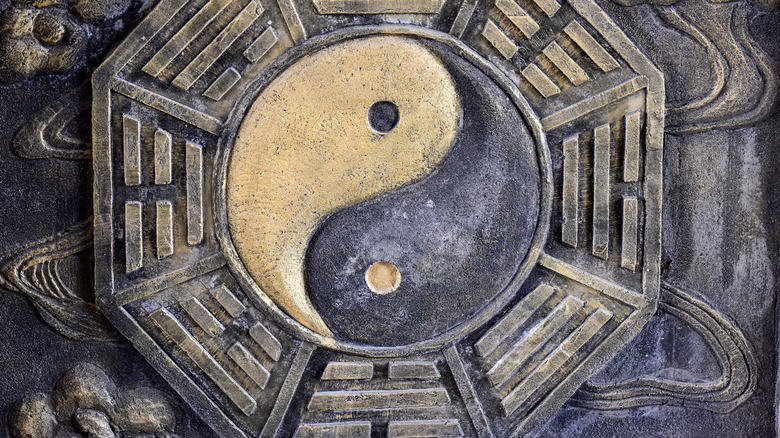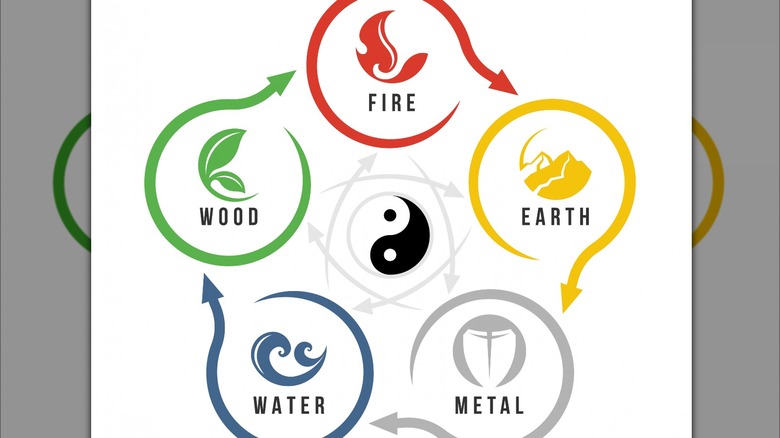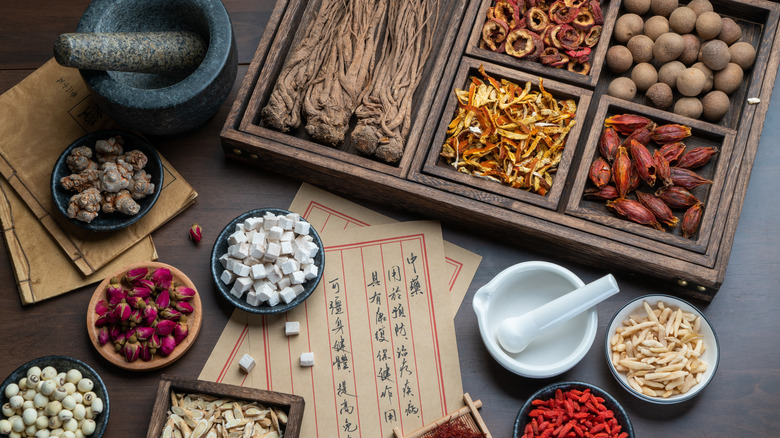What Are The Five Elements Of Taoism?
Taoism (also known as Daoism) is a philosophy that has been around for thousands of years, leaving a profound effect on Chinese culture and, subsequently, the rest of the world. The central tenets of Taoism hold that all beings in the universe should try their best to be in harmony with the Tao, meaning the Way, which is believed to be the nature of the universe. To Taoists, the energy of the universe, or ch'i, permeates through all things and is constantly transforming as the world goes on (via National Geographic).
As the religion spread over thousands of years, Taoist spiritual practices and philosophical ideas were often intermixed with other ideologies such as Buddhism and Confucianism. In fact, there's even a story where the supposed founder of Taoism, Lao Tzu, met with Confucius (per Encyclopedia of Philosophy). Since Taoists were trying to act in accordance with the Tao, they had to understand how the world actually worked. This led to Taoists believing that everything in the universe was constructed into five basic elements: wood, fire, metal, water, and earth (via Yin Yoga).
Taoist cosmology
In Taoism, the elemental cycle is what connects all things. Fire, earth, water, metal, and wood depend on each other to grow. Specifically, fire is needed to make metal from the earth, water grows wood, and the earth absorbs water. Since everything is cyclical, Taoists believe that it is in our best interest to live in harmony with this cycle, according to Yin Yoga. Given this combination and recombination of elements, the Taoists believe this is what creates all 10,000 things, states Learn Religions.
To Taoists, these elements came into existence through the primordial forces of Yin and Yang. Yin is the feminine energy in Taoism, and this is correlated with darkness — or evil — along with absorption. Yang is seen as the male energy source that represents heaven — light — and is symbolically seen as a dragon (via Britannica). The combining of these two energies, which forms the iconic Yin-Yang, is what forms all of these elements.
Body and mind
Interestingly enough, the elements don't only relate to the external things of the world — they also have to do with our bodies and health. The liver and the gallbladder are believed to be associated with the wood element, but their associations with the yin and yang are different. Even though the liver is related to wood, it is also associated with Yin, whereas the gallbladder is associated with Yang, according to Learn Religions.
Elements are also correlated with emotions and virtues. Anxiety is an emotion believed to come from fire, and joy is seen as the fire virtue. Wood is the element associated with anger, and its virtue is kindness, two seemingly opposing forces. Fire's counterpart, water, is associated with the emotion of fear, and wisdom as a virtue. In Western culture, this may seem strange since fire is typically tied to anger, whereas water is associated with calmness — a perfect example of how different cultures can affect perceptions of the world.
Medicinal practices
As Taoism spread throughout China, many clerics and doctors used the doctrine of the five elements to concoct certain medicines and herbal treatments, some of which are still used by homeopathic users and clinicians today. Since Taoists believe that everything is composed of the five elements, illness, disease, and other ailments that affect humans are believed to be a result of an elemental imbalance. Therefore, many homeopathic treatments are prescribed based on the idea of returning the body to stasis, according to Better Health.
When Taoist practitioners diagnosed an illness, they would determine which element the person needs to improve. Many herbal medicines were concocted based on the way they tasted since flavor was attributed to the elements. Wood was seen as sour, fire as bitter, metal as pungent, earth as sweet, and water as salty (via Learn Religions). Whatever organ was causing the patient harm would determine the treatment. So, if an organ associated with fire were hurting, the patient would be given a bitter herbal treatment.
Counting stars
The Taoist elements not only aided doctors but also astrologers as well. The elements were associated with worldly things as well as celestial objects like planets and even had significance when deciding the names for days. Wood correlated with Jupiter, fire with Mars, earth with Saturn, metal with Venus, and water with Mercury, according to Learn Religions.
In early China, astrologers studied and measured the orbital path of Jupiter to create a calendar. These people determined that Jupiter took approximately 12 years to make a full rotation around the sun, and so divided the year into 12 different months, or the 12 Earthly Branches, states China Culture. There were also "heavenly stems" that were used to name the days, helping officials plan for rituals and other significant events. The heavenly stems were believed to come from the five elements — Jia and Yi were associated with wood, Wu and Ji with earth, Bing and Ding with fire, Ren and Gui with water, and Gen and Xin with metal, per Learn Religions.
Taoism today
One could argue that Taoism's greatest contribution to ancient Chinese society and the world as a whole was its naturalistic roots. Taoism, for the most part, was largely unconcerned with how society should work — or morality — and mainly focused on being in accord with the natural world. This idea is what helped grow medicinal knowledge and astronomical knowledge, pushing the sciences forward (via National Geographic).
Taoism has also had a profound impact on art, which can be seen in Taoist rituals or shrines. Seemingly contradicting, Taoists do hold ceremonies from time to time that are meant to pay respects to certain deities or deceased family members, as well as cast spells or say a prayer for good luck, according to World History Encyclopedia. Many Taoists have shrines in their own homes where they pay their respects privately, but from time to time, musicians, dancers, or the like will come to town for a celebration. According to Pew Research Center, about 8.7 million people classify themselves as Taoists today — mostly in China. Curiosity about the world helped lead Taoism to success, leaving an undeniable impact not just on China but the entire world.





